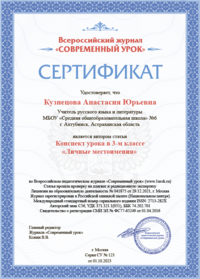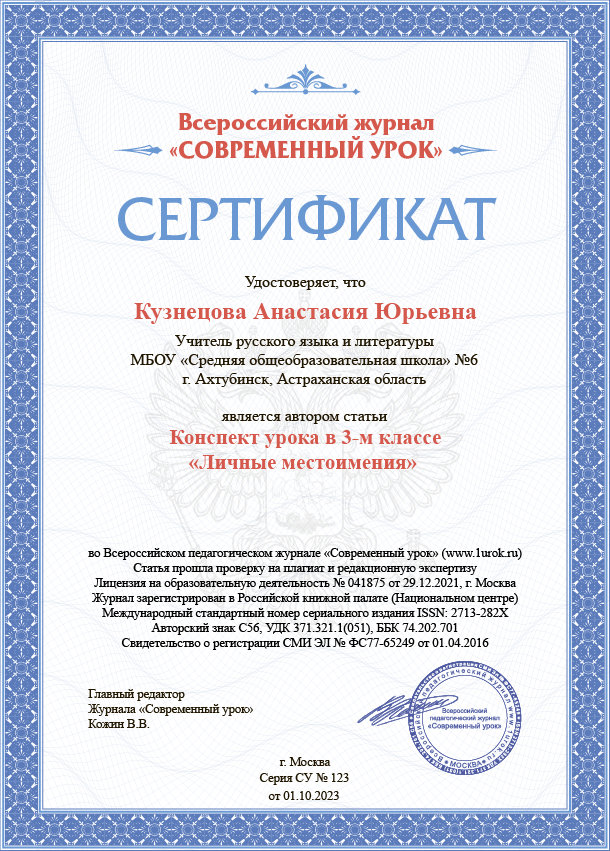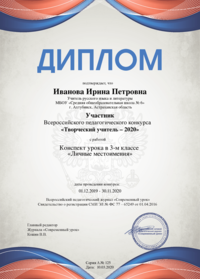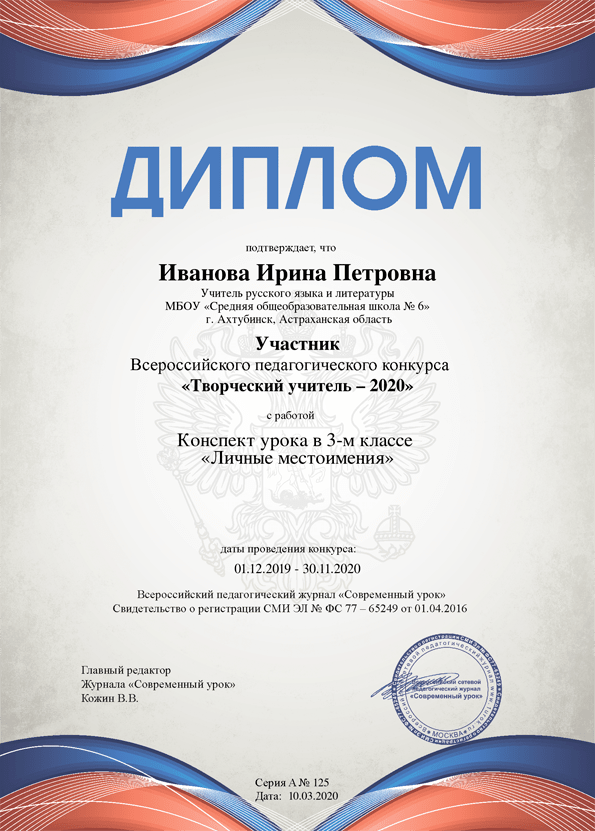Разработка урока «Удивительный мир насекомых»
Автор: Крижевская Анна Юрьевна
Организация: МБОУ г. Горловки «Школа № 48»
Населенный пункт: ДНР, г. Горловка
Метазадачи:
Образовательные:
- Изучение новой лексики, речевых образцов.
- Тренировка грамматических навыков составления предложений.
Развивающие:
- Развивать коммуникативные умения учащихся в говорении и чтении.
- Развивать долговременную память, фонематический слух, речь учащихся.
Воспитательные:
- Воспитывать вежливость, нравственность, духовность, бережное отношение к природе, интерес к познанию окружающего мира.
- Формировать устойчивый интерес к дальнейшему изучению иностранного языка.
Формирование УУД:
Личностные действия: проявлять интерес к познанию мира.
Регулятивные действия: постановка учебной задачи, оценивание качества и уровня усвоения материала.
Познавательные действия: поиск и выделение необходимой информации.
Коммуникативные действия: умение с достаточной полнотой и точностью выражать свои мысли.
Планируемые результаты:
Личностные результаты:
-знакомство с миром природы, с богатством самого большого и распространенного класса животных.
- осознание языка, в том числе иностранного, как основного средства общения между людьми
Метапредметные результаты:
1. Развивать умение составления описания насекомого.
2. Развивать умения в использовании фоновых знаний для прогнозирования содержания текста.
3. Развивать умения монологической речи на основе прочитанного текста.
4. Развивать интеллектуальные способности (мышление, внимание, память, фантазию, сообразительность, языковую догадку).
Предметные результаты:
В процессе овладения английским языком у обучающихся будут развиты коммуникативные умения по видам речевой деятельности.
В говорении обучающийся научится:
- вести и поддерживать элементарный диалог;
- кратко описывать и характеризовать предмет;
- рассказывать о своей школе;
- воспроизводить наизусть небольшие произведения детского фольклора: рифмовки, стихотворения, песни;
- кратко передавать содержание прочитанного/услышанного текста.
Тип урока: формирование новых знаний
Форма урока: комбинированный.
Методы и формы обучения: объяснительно-иллюстративный, практический, творческий; фронтальная, индивидуальная.
Оснащение урока: УМК «Spotlight», компьютер (презентация “Insects”), карточки, картинки, “Geopardy Game”, звуковое сопровождение.
Ход урока
- Организационный момент
- Приветствие:
Teacher (T):
Hello, children
Hello, children
How are?
How are?
I’m fine, Thank you
I’m fine, Thank you
And you?
And you?
Let’s begin our lesson.
- Фонетическая зарядка
T: Look at the screen. (слайд 2)
Therе is а rhyme. Let’s listen to a rhyme about a butterfly:
Butterfly, butterfly
Where do you fly?
So quick and so high
In the blue, blue sky.
- Listen and repeat after me. (Учащиеся повторяют построчно рифмовку)
- All together (Учащиеся повторяют рифмовку хором)
3. Речевая зарядка. Warming up. Актуализация опорных знаний.
T: My, friends, the world around us is varied and beautiful.
If you go to a farm you meet farm animals. Do you know any farm animals? Name them. (Учащиеся называют домашних животных) (a hen, a duck, a cow, a goose, a goat, a sheep, a rabbit) (Слайды 3-9)
T: If you go to the zoo or to the forest you meet wild animals. Do you know wild animals? Name them. (Учащиеся называют диких животных) (a bear, a leopard, a crocodile, a rhino, a deer, a cobra, camel, an elephant, a lion). (Слайды 10-18)
T: When you come home you meet pets. Name them (Учащиеся называют домашних питомцев) (a cat, a dog, a guinea pig, a goldfish, a tortoise). (Слайды 19-23)
Т: Who has a pet? What pet have you got? Is she/ he big, small, clever. What colour is she/he? Do you like him?
(Ответы обучающихся, рассказывают о своих домашних животных)
- Мотивация урока. Т: Listen to the sounds. (Звук сверчка)
Are they animals?
No!!! Of course they are not animals.
Т: What are they?
Pupils: Insects.
T: Today we are going to travel to an interesting world of insects. We will learn the names of some insects, will read the text about them, get new information about insects, make a project.
- Основная часть урока
- Введение лексики:
Look at the screen. (Слайды 24-28) Listen and repeat after me: T – Cl:
Mosquito
Wasp
Butterfly
Dragonfly
Beetle
Fly
Grasshopper
Ladybird
Bee
Ant
Повторяем слова индивидуально по схемам: T-P1, P2 (слайд 24-28)
Oh, there are many words.
- Find insects (выполняем задание “найди слова”) (слайд 29):
Ladybird, hen, dragonfly, bee, goose, deer, fly, camel, ant, tortoise, beetle, duck, cow, mosquito, dog, wasp, grasshopper. (Ответы учащихся)
Т: What insects can’t fly? (Ответы обучающихся: grasshopper, ant). They are ground insects.
The others can fly. They are flying insects.
3. Работа с текстом.
a) Let’s look at ex. 2a on p. 73 and read the title. What do you expect to read about? (Ответы обучающихся)
Look at the picture and repeat the words. Do you know how many legs bees have got? (Ответы обучающихся)
b) Scan the text and what is missing. Fill in the gaps (работа вместе). Read the text (слайд 31).
There are about ... million types of insects in the world. These little creatures live in our ... and gardens. Some live near water, others live in fields, ... and forests. Some ... come out during the day while others come out at night.
... are really important. They keep our gardens clean because they ... dead leaves and other waste. They are also an important food for ... and other animals. Some insects, like bees even make food - ....
с) Look at 2b and answer the questions
(Обучающиеся отвечают на вопросы к тексту)
Физминутка (Слайд 30)
Let’s relax
Let’s fly like a butterfly
Let’s jump like a grasshopper
Let’s fly like a fly
Let’s walk like a ladybird.
T: We have two groups
Writing
4.Complete the table (по группам):
|
Mosquito |
They are ... (colour). |
They live in... |
They can/can’t... |
|
Ant |
They are ... (colour). |
They live in... |
They can/can’t... |
Let's check. Are you ready?
Tell about the insects using the table. Who can?
- Speaking. Метаприем “Geopardy game”(Презентация 2)
6. Метаприем.Синквейн.
-I think, now, you can talk (speak) about insects. And our task is to summarize everything we know about them.
1. What are we talking today about?
2. Give me 2 adjectives characterizing insects.
3. Now give 3 verbs characterizing them.
4. Give me 4 words or one sentence, describing them.
5. Give me only one word, a synonym which will complete our cinquain.
Учащиеся составляют синквейн по группам, затем идет афиширование синквейна на доску.
Примеры:
1.Insects.
2. Amazing, little
3.Live,fly,clean
4.Insects keep gardens clean.
5.Creatures
1. Insects.
2.Important, interesting
3.Fly,help,work
4. They are busy.
5. Friends
7.Выполнение проекта: (работа в группах, раздать два плаката)
Т: Look at the posters. They are nice. There is а funny sun, flowers, green grass, mushrooms but they haven’t got any movement, no people, no animals, no birds. Make a project and then tell us about insects, you can use your table and the text. I have got some insects, but they are colourless. Make them bright and colourful, glue them. Do it as quick as you can. You have 3 minutes. (Учащиеся выполняют проект.)
Т: The time is over
Let’s look at them, show us your projects. Two of you, come here.
T: Who can you see? What colour are they? What can they do? Where do they live?
(Обучающиеся представляют свои проекты, описывают насекомых)
Т: Your project is good and yours is good too. I like your projects. What about you? Do you like them?
(Ответы обучающихся)
Now they are bright, there are many insects. What do you see here? Name them.
The nature is so beautiful, protect it.
Do you hear sounds? The world is so nice with insects. They are really important. They keep our garden clean, eat waste, bees make honey
- III.Подведение итогов уроков.
- Рефлексия.
а) What did we do during our lesson?
b) What interesting thing did you get to know?
c) Do you like such a lesson?
- Оценивание обучающихся. Do you hear buzzing?
(Звук пчелки). (Игрушка - пчелка)
I’m a bee. I work much, day and night. I have a big family. All bees work hard. There is an English saying: аs busy as a bee. Do you know its Russian equivalent? – (трудолюбивый как пчелка). And you worked as bees.
What’s in? (показываю подарочную коробку) Hearts. They are parts of my own heart. You are nice. You know English well. Thank you for your help. You’ve got five, four for the lesson. You worked well. (Оцениваю обучающихся.)
- Домашнее задание: Open your diaries, and write down your hometask. It is to learn new words on р 73.
- Goodbye, my friends! Thanks for the lesson!

 БЕСПЛАТНЫЕ семинары
БЕСПЛАТНЫЕ семинары





